Marbury v madison answer key – Marbury v. Madison Answer Key delves into the pivotal Supreme Court case that shaped the American legal system. This key provides a comprehensive understanding of the landmark ruling, its implications, and its enduring impact on the nation’s governance.
The case established the principle of judicial review, empowering the Supreme Court to declare laws unconstitutional. It also reinforced the supremacy of the Constitution, ensuring that it stands as the highest law of the land.
Marbury v. Madison Case Overview
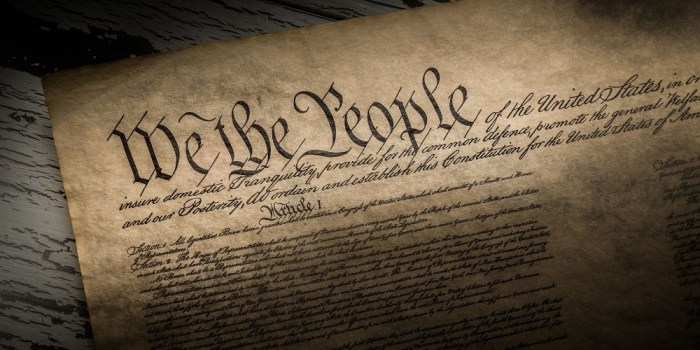
Marbury v. Madison was a landmark case decided by the U.S. Supreme Court in 1803. It established the principle of judicial review, giving the Court the power to declare laws unconstitutional. The case arose when William Marbury, a political appointee of President John Adams, sued Secretary of State James Madison for refusing to deliver his commission.
The Court ruled in Marbury’s favor, but Chief Justice John Marshall went further and declared that the Judiciary Act of 1789, which had given the Court the power to issue writs of mandamus, was unconstitutional.
Significance, Marbury v madison answer key
Marbury v. Madison is significant for several reasons. First, it established the principle of judicial review. This means that the Supreme Court has the power to declare laws unconstitutional if they violate the Constitution. Second, it established the supremacy of the Constitution.
This means that the Constitution is the supreme law of the land and that all other laws must conform to it. Third, it established the principle of separation of powers. This means that the three branches of government (legislative, executive, and judicial) are separate and independent from each other.
Judicial Review
The principle of judicial review is based on the idea that the Constitution is the supreme law of the land. This means that all other laws, including acts of Congress, must conform to the Constitution. If a law violates the Constitution, it is the duty of the Supreme Court to declare it unconstitutional.
Supremacy of the Constitution
The supremacy of the Constitution means that it is the highest law in the land. All other laws, including acts of Congress, must conform to the Constitution. If a law violates the Constitution, it is void and cannot be enforced.
Separation of Powers
The principle of separation of powers means that the three branches of government (legislative, executive, and judicial) are separate and independent from each other. This means that each branch has its own powers and responsibilities and that no one branch can exercise the powers of another branch.
Judicial Review and the Constitution: Marbury V Madison Answer Key
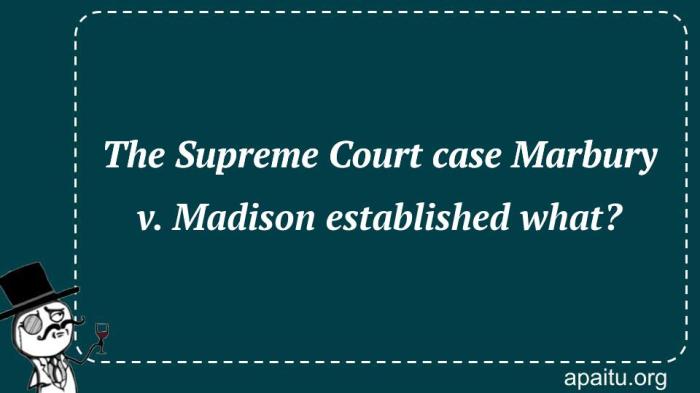
Judicial review, a cornerstone of the American legal system, empowers courts to determine the constitutionality of laws. This authority, established in Marbury v. Madison, has played a pivotal role in protecting individual rights and upholding the Constitution.
Marbury v. Madison (1803) marked a watershed moment in American jurisprudence. In this landmark case, the Supreme Court, under Chief Justice John Marshall, asserted its authority to declare laws unconstitutional. This decision established the principle of judicial review, granting courts the power to interpret the Constitution and strike down laws that violate its provisions.
Landmark Cases and Judicial Review
Judicial review has been instrumental in safeguarding individual rights and upholding the Constitution. Some notable examples include:
- Brown v. Board of Education(1954): The Supreme Court ruled that racial segregation in public schools violated the Equal Protection Clause of the Fourteenth Amendment, overturning the “separate but equal” doctrine.
- Roe v. Wade(1973): The Court recognized a woman’s constitutional right to an abortion under the Due Process Clause of the Fourteenth Amendment.
- Citizens United v. FEC(2010): The Court held that corporations have the same First Amendment rights as individuals, allowing them to spend unlimited amounts of money on political campaigns.
The Supremacy of the Constitution
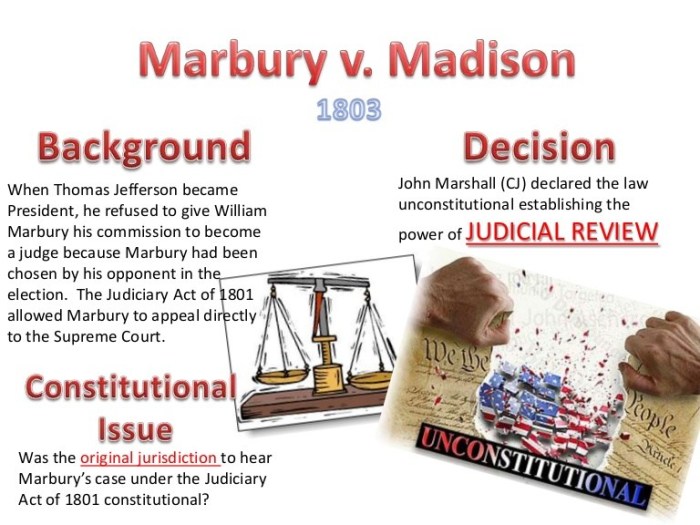
The principle of the supremacy of the Constitution establishes that the Constitution is the highest law of the land, and all other laws, including state laws and federal statutes, must comply with it. This principle ensures the Constitution’s authority as the fundamental framework for the United States’ legal system.
Marbury v. Madisonreinforced this idea by establishing the principle of judicial review, which allows the Supreme Court to declare laws unconstitutional. This decision solidified the Constitution’s position as the ultimate authority in determining the validity of laws.
Conflicts between Federal and State Laws
Conflicts between federal and state laws arise when state laws contradict or interfere with federal laws. In such cases, the supremacy of the Constitution dictates that the federal law prevails.
- Gibbons v. Ogden (1824):This case involved a conflict between a federal law regulating interstate commerce and a New York law granting a monopoly on steamboat navigation. The Supreme Court ruled that the federal law superseded the state law, upholding the supremacy of federal authority in regulating interstate commerce.
- McCulloch v. Maryland (1819):In this case, the Supreme Court ruled that a state could not tax a federal bank, as it would interfere with the federal government’s power to create and operate banks.
These cases demonstrate how the principle of the supremacy of the Constitution ensures that federal laws take precedence over conflicting state laws, maintaining the integrity and uniformity of the nation’s legal system.
Impact on American Government
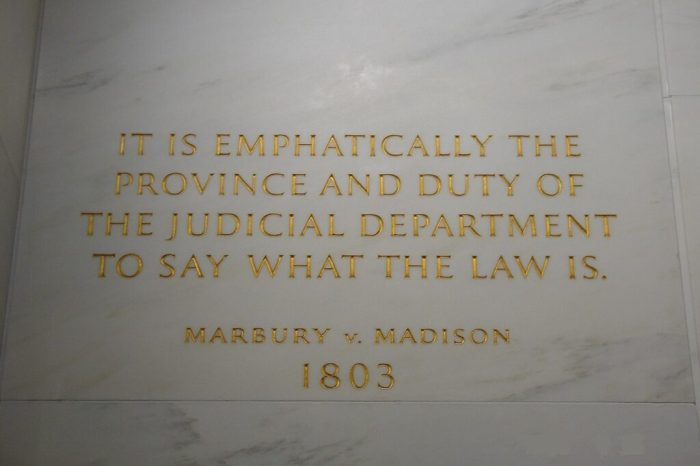
Marbury v. Madison profoundly shaped the American government, establishing the principle of judicial review and solidifying the role of the judiciary as a check on the other branches.
To understand the concept of judicial review in Marbury v. Madison, it’s helpful to delve into the nuances of AP Human Geography Unit 1 by taking an ap hug unit 1 practice test . By examining the complexities of both topics, you’ll gain a deeper understanding of the foundational principles that shape our legal and political systems.
Returning to Marbury v. Madison, you’ll appreciate the significance of this landmark case in establishing the Supreme Court’s authority to declare laws unconstitutional.
Judicial Review
The decision in Marbury v. Madison established the principle of judicial review, giving the Supreme Court the authority to declare laws unconstitutional. This power has enabled the judiciary to strike down laws that violate the Constitution, protecting individual rights and liberties.
- Example:In 1973, the Supreme Court ruled in Roe v. Wade that a woman’s right to an abortion is protected by the Constitution.
Separation of Powers
Marbury v. Madison strengthened the separation of powers by clarifying the role of the judiciary as an independent branch of government. The decision prevented the executive branch from overriding the judiciary’s decisions, ensuring that no single branch could become too powerful.
Public Policy
Judicial review has been instrumental in shaping public policy by allowing the courts to strike down laws that are unconstitutional or violate individual rights. This has led to the expansion of civil rights, the protection of environmental resources, and the advancement of social justice.
- Example:In 1954, the Supreme Court ruled in Brown v. Board of Education that racial segregation in public schools was unconstitutional, paving the way for the desegregation of schools across the country.
Historical Context and Precedents
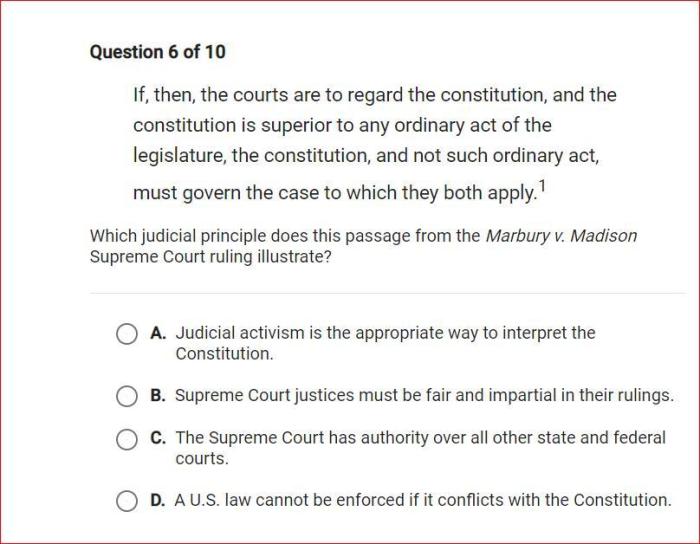
The case of Marbury v. Madison arose out of the political turmoil surrounding the 1800 presidential election. In a bitterly contested election, Thomas Jefferson defeated incumbent John Adams, and the Federalists, who had controlled the government for the past 12 years, found themselves out of power.
In the waning days of the Adams administration, Federalist judges were appointed to newly created positions in the federal judiciary. Among them was William Marbury, who was appointed as a justice of the peace in the District of Columbia. However, Marbury’s commission was not delivered before Adams left office, and Jefferson’s Secretary of State, James Madison, refused to deliver it.
Political and Social Climate
The political climate at the time of Marbury v. Madison was highly partisan, with both the Federalists and the Republicans deeply divided over the future of the country. The Federalists, who were generally more supportive of a strong central government, were concerned about the growing power of the states and the erosion of federal authority.
The Republicans, on the other hand, were more suspicious of federal power and believed that the states should have more autonomy. They were also concerned about the growing influence of the judiciary, which they saw as a threat to the democratic process.
Relevant Precedents
The Court’s decision in Marbury v. Madison was influenced by a number of earlier cases, including:
- Chisholm v. Georgia(1793): In this case, the Supreme Court ruled that states could be sued by citizens of other states. This decision was controversial at the time, and it helped to establish the principle of judicial review.
- Hylton v. United States(1796): In this case, the Supreme Court upheld the constitutionality of a federal tax on carriages. This decision helped to establish the principle of implied powers, which allows the federal government to exercise powers that are not explicitly granted in the Constitution.
FAQ Compilation
What is the significance of Marbury v. Madison?
Marbury v. Madison established the principle of judicial review, allowing the Supreme Court to declare laws unconstitutional, and reinforced the supremacy of the Constitution.
How does judicial review impact the American legal system?
Judicial review ensures that laws comply with the Constitution, protecting individual rights and upholding the balance of powers.
What is the principle of the supremacy of the Constitution?
The supremacy of the Constitution establishes it as the highest law of the land, overriding any conflicting federal or state laws.